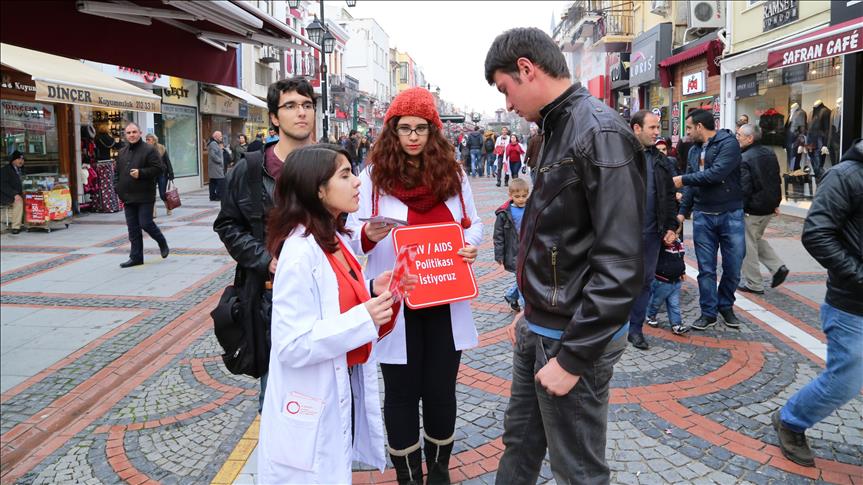 File photo
File photo
ANKARA
The number of people living with HIV/AIDS in Turkey in 2016 reached 1,734 on Wednesday, 84.3 percent of whom were males and 15.7 percent females, according to the Health Ministry.
In a statement issued on the eve of World AIDS Day, the ministry said there were 1,661 HIV and 73 AIDS cases detected out of the total, 16.5 percent of whom were of foreign nationals.
The number of HIV/AIDS cases is increasing in several parts of the world, including Turkey, Ukraine, Moldova and Russia.
HIV can be transmitted through unprotected sexual intercourse, intravenous drug use and the common use of injectors, infected blood transfusions, or from mother to baby during pregnancy, childbirth or breastfeeding after childbirth, the statement added.
Emphasizing that HIV/AIDS cases must be declared in line with the notification system of infectious diseases, the statement said the coded notification system has been used since 1994 to prevent discrimination and stigmatization of HIV positive individuals.
The statement also noted that out of the total cases detected, 49.7 percent cases were sexually transmitted. "Two thirds of the sexually-transmitted cases of the infection result from heterosexual sexual intercourse, and 1.6 percent of the cases result from intravenous drug use, while the transmission of 46.5 percent cases remains unclear."
In the cases diagnosed in 2016 in Turkey, HIV most frequently occurred in the 25 to 29 age range.
According to the new WHO guidelines on HIV self-testing to improve access to and uptake of diagnosis, lack of an HIV diagnosis is a major obstacle to implementing the Organization’s recommendation that everyone with HIV should be offered antiretroviral therapy (ART).
The report reveals that more than 18 million people with HIV are currently taking ART, and a similar number is still unable to access treatment, the majority of which are unaware of their HIV positive status.
"Today, 40 percent of all people with HIV [over 14 million] remain unaware of their status. Many of these are people at higher risk of HIV infection who often find it difficult to access existing testing services," it said.
"Millions of people with HIV are still missing out on life-saving treatment, which can also prevent HIV transmission to others," Dr. Margaret Chan, WHO director-general, said in the statement.
"HIV self-testing should open the door for many more people to know their HIV status and find out how to get treatment and access prevention services," Chan said.
The report recalls the HIV self-testing which enables people to use oral fluid or blood-finger-pricks to discover their status in a private and convenient setting.
"Results are ready within 20 minutes or less. Those with positive results are advised to seek confirmatory tests at health clinics," it added.
Reporting by Melike Kinaci; Writing by Sibel Uğurlu;
Anadolu Agency website contains only a portion of the news stories offered to subscribers in the AA News Broadcasting System (HAS), and in summarized form. Please contact us for subscription options.

